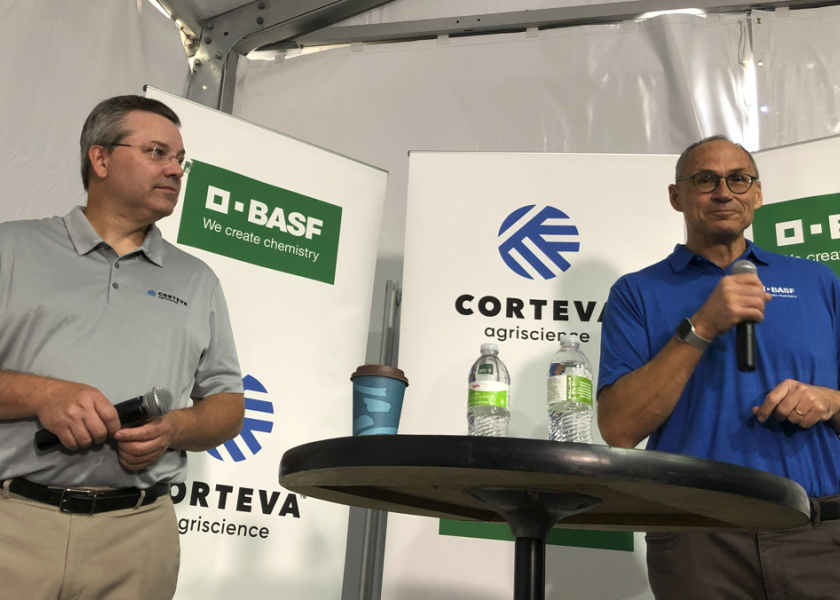Corteva, BASF Partner to Deliver New Weed-Control Solution to Soybean Growers

Sometimes teamwork can make the dream work. While that’s the title of a popular book by John Maxwell, it also describes the reason for a new partnership between Corteva Agriscience and BASF Agricultural Solutions.
Together, the two industry giants expect to accomplish what individually no company has done: introduce a four-way herbicide-tolerant trait stack in elite soybean germplasm.
“What we are dedicated to doing is bringing growers really new options, new choices for weed control,” said Peter Eckes, president of research and development and regulatory for BASF, during a joint press conference with Corteva on Tuesday.
Eckes said when he started working in the crop protection industry 20 years ago, that farmers could control “most any weed,” but today that is not the case with the development and extensive spread of weed resistance through much of the U.S. and globally.
“Specifically, what we're doing is bringing together four unique modes of action we'll be putting on top of our Enlist platform,” added Sam Eathington, executive vice president, chief technology and digital officer, Corteva Agriscience.
In a joint press release, the companies said:
• BASF will license its proprietary PPO (protoporphyrinogen oxidase) gene for herbicide tolerance to Corteva to develop a new herbicide-tolerant trait stack. The stack will include tolerance to BASF’s Liberty (glufosinate ammonium), Corteva’s Enlist herbicides (2,4-D choline with Colex-D® technology) and various glyphosate herbicide solutions, as well as BASF’s existing and pipeline PPO inhibiting herbicides, all demonstrating excellent crop safety. BASF PPO inhibiting herbicides include Kixor, Tirexor and a new PPO-inhibiting herbicide under development by BASF.
• The stack of four herbicide tolerant traits is expected to be available in all Corteva seed brands. Corteva has licensed the stack for use in BASF seed brands.
• Corteva anticipates licensing the new trait stack to independent seed companies in North America.
• Both companies plan to offer exclusive and proprietary germplasm options with the stack, enabling farmers to work with their preferred seed supplier and route to market.
The companies anticipate commercialization of these advancements in the early 2030s, pending regulatory reviews and completion of field testing, with the first launch in North America.
“Technology moves faster than the regulatory process,” Eathington said, referencing the long timeframe for the market launch.
He said it takes about 10 years to go through the overall process, “from identifying genes that offer production benefits and then putting them in elite germplasm and then going through the various regulatory processes in place around the world to make sure a viable market is in place.”
Eckes added that there is a new five-way PPO stack in development as well. “With that we will have an additional tolerance -- a new-to-the world mode of action—the first to be introduced into the marketplace since HPPD back in 1989,” he said.
Specifically, BASF will develop a new trait stack for soybeans which provides tolerance to five herbicide groups, including Corteva’s cross-licensed 2,4-D choline gene. This longer-term approach from both companies will provide competitive alternatives for soybean farmers well into the 2040s, the partners said.







